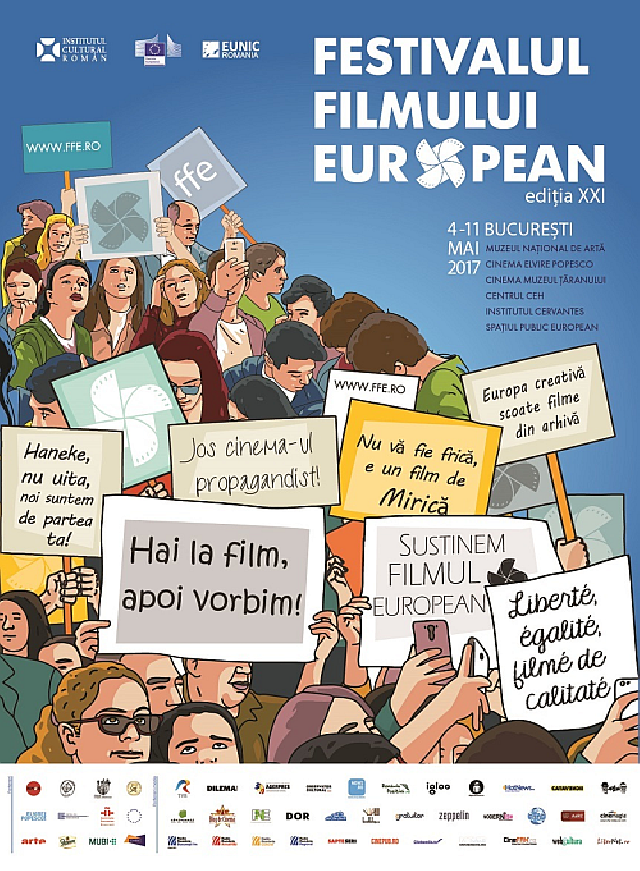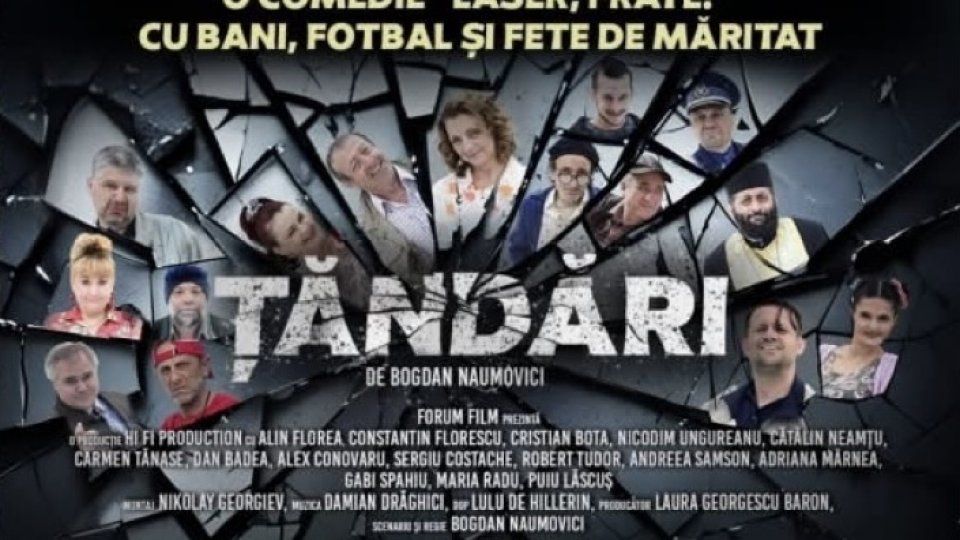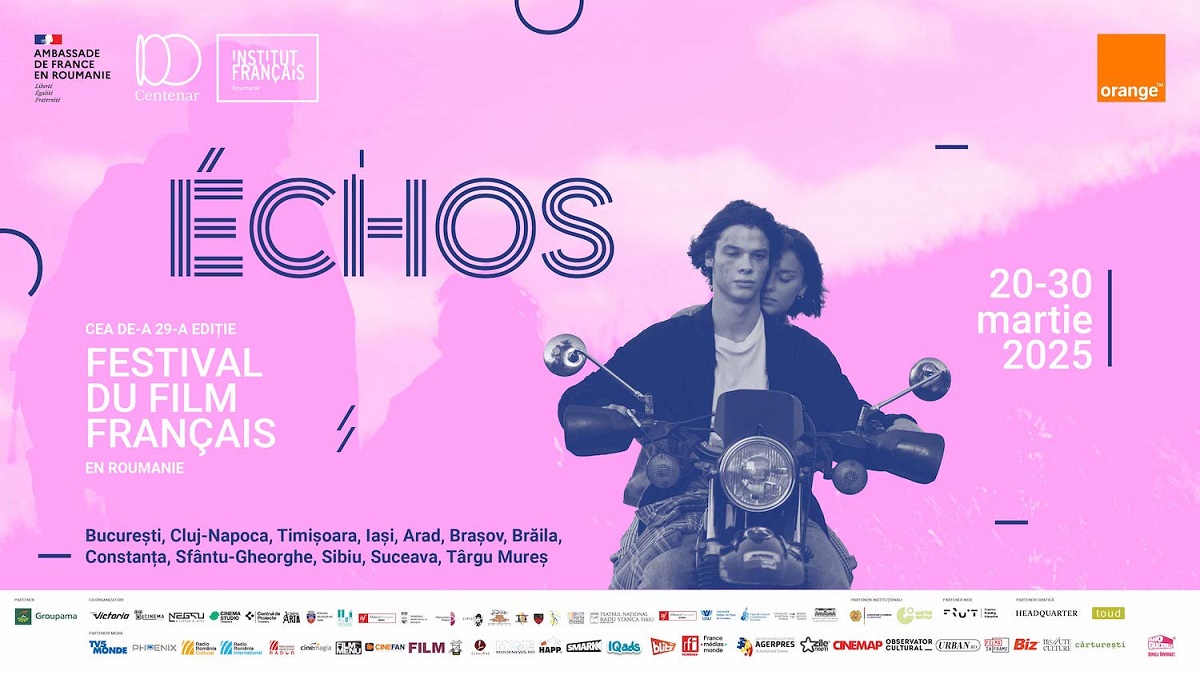The European Film Festival
60 films were screened this year at the European Film Festival held in Bucharest and other cities in Romania.

Corina Sabău, 27.05.2017, 14:03
The European Film Festival (EFF) held in Romania has
now reached its 21st edition. This year it included as many as 60
productions of various types, more than 35 of which were screened as an absolute
first in Romania. But the Festival did not include only the usual screening
nights. It also offered debates designed to challenge the audience and to
invite them to experiment with virtual reality. The 2017 edition of the EFF has
on offer 64 documentaries, biographical films, dramas, comedies, animation
movies, thriller and horror movies, short and medium-reel films, experimental
films as well as Virtual Reality (VR) films. Of the total number, 42 were
launched in 2017 and 2016. With details on that, here is the EFF coordinator
Anca Hrab:
Ever since its early days, the Festival brought
together all kinds of productions. This is a catchphrase we have preserved,
because it plays very well into the message of the festival, it is very
suggestive. It is difficult to label films, we usually avoid doing this.
Hollywood movies may be easier to label, but the European film is more
difficult to fit into specific categories. This is why we opted for this
formula which we found more suitable, namely ‘films of all kinds’.
The EFF’s 21st edition was held in
Bucharest May 4th through 11th, in Iasi, eastern Romania,
May 12th through 14th, in Targu Mures, central Romania,
May 19th to 21st, Gura Humorului, in northeastern
Romania, May 19th to 21st, and in Timisoara, on May 26th
to 28th. For the first time in its history, a gala screening of Aki
Kaurismaki’s film, The Other Side of Hope (Finland, 2017), a premiere for
Romania, opened in all 5 locations of the festival.
LUX is one of the main sections of the EFF. It presents
the three film productions that got through to the final in the most recent
edition of the LUX Prize offered by the European Parliament. ‘Comics’ is a
section which was specially created to celebrate the European Comics Salon.
‘Young Audiences’ includes films for children and teens, while ‘Film in the
Republic of Moldova’ includes shorts and medium-reels made in the Republic of
Moldova. Speaking about that, here is the EFF coordinator Anca Hrab once again:
We should mention that this year, apart from the
usual screening nights, we have expanded the range of events and took up a
direction which brings debates on current issues into the limelight. This is
why for this edition of the EFF we have selected productions likely to spark
debates, to be starting points for a series of debates focusing on topics that
are relevant for society. Many of those films were included in the Agora
section. There were also films offered by the ARTE channel, a very important
partner for this edition, then again, for two days running we screened
documentaries at Romania’s National Art museum. We have also staged many
discussions, one of those focused on human trafficking and was based on Adrian
Sitaru’s The Fixer and Maria, a German film made in 2016. Another debate
section was based on the film screened at the opening gala, ‘The Other Side of
Hope’, by Aki Kaurismaki, and was organised jointly with a very bold festival,
SUPER. It is a festival organised by teenagers, and its main themes this year
are migration and acceptance through empathy.
Two other panels staged as part of the EFF were
Preparing Romania’s position in the reform of the European audio-visual
policy and #RebuildingEurope in Sarajevo an event organised together with
the National School of Political and Administrative Studies, a debate based on
The Siege, a film produced in 2016.
Paul Negoescu is the director of Two Lottery Tickets,
a 2016 production inspired from a short story by the outstanding Romanian
playwright Caragiale. Negoescu is this year’s ambassador of the European Film
Festival, EFF. For me, cinema is a universal language and I’m reluctant to splitting it geographically, ethnically or
nationally. I equally appreciate European, American, Iranian or Japanese films.
However, the European film has a special meaning for me, as I relate with its
values, Paul Negoescu says. Paul directed the promotion clip for the
present edition of the EFF, starting off from his own idea which illustrates
his love of the European film. Fully in line with the new trend of the
Festival, the clip hints at the ability of film to stir not only emotion, but
also to create dialogue, a category the European film brilliantly illustrates.
With details on that, here is Paul Negoescu himself:
When I was a student and even before being admitted
to University, the European Film Festival was one of the few opportunities to
watch European productions in Bucharest. Back then there were not so many
opportunities to watch this kind of movies, there were not so many festivals
either. We used to have Dakino, the French Film Festival, the British Film
festival and the European Film Festival. The main idea of the clip I created
for the Festival came to me during this winter’s protests, particularly since
during the same period protest rallies were being held in other countries as
well. And I thought I could build on this idea of protests which generate
discussions and debates. I mean, with everybody involved in some protest, why
wouldn’t film lovers, those who want better films, protest as well?
In European
cinema, the author’s vision is above the financial investors’ interests, and
when the author has full creative freedom, authentic, unconventional and daring
films can arise. Moreover, in times that seem to get more and more divisive, cinema
upholds as a social hard core able to bring us together, and the European film
makes no exception, filmmaker Paul Negoescu says.
The European Film Festival is organised by the
Romanian Cultural Institute, under the aegis of EUNIC Romania, in a partnership
with the European Commission Representation, and with the support of European
embassies and cultural centres, of the National Art Museum, the National
Peasant Museum, the Peasant Museum Cinema, the French Institute, the Elvire
Popesco Cinema. Also supporting the European Film Festival were the Czech
Centre, the Cervantes Institute, the Filmmakers Union in Romania and the
European Parliament Information Office in Romania.





























